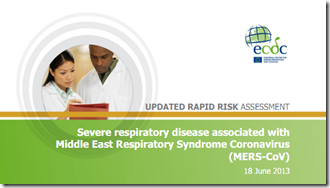# 7408
The ECDC, which last updated their MERS-CoV Risk Assessment in mid-May, has published an impressive update today that adds:
- Updated epidemiological situation including cases in new EU country
- Guidance on aircraft contact tracing
- Incubation period extended to 14 days
- Guidance to travelers to the Middle East.
In this update the authors express – on more than one occasion – their concerns over the lack of data being provided on cases from inside Saudi Arabia (e.g. reservoir host, risk groups, incubation period, mode of transmission, etc.) despite `the requirements formulated in Article 6.2 of the 2005 International Health Regulations.’
Citing the difficulties in making an accurate risk assessment when `insufficient data’ is being provided, the authors warn:
Consequently, it is not possible to estimate the disease risk with any degree of accuracy. As a result, ECDC has to consider a number of underlying scenarios that are compatible with the information available.
At this stage, it is not possible to exclude a future SARS-like scenario, especially in the light of the hospital-related outbreaks in Jordan and Al-Ahsa, Saudi Arabia.
This undercurrent of frustration over the lack of epidemiological data surfaces again in the final statement in their conclusions section, which reads:
- These conclusions should be viewed in the light of the many uncertainties surrounding the investigation of cases in the Middle East. It is unusual to have such a degree of uncertainty at this stage in an outbreak.
As we’ve come to expect from the ECDC, this risk assessment does a great job summarizing what we know (and don’t know) about this emerging threat, provides some new graphics, and is well worth reading in its entirety.
The news release, along with links to the revised document follow:
Middle East respiratory syndrome coronavirus: updated guidance in ECDC Rapid Risk Assessment
19 Jun 2013
ECDC
The latest update of ECDC Rapid Risk Assessment on Middle East respiratory syndrome coronavirus(MERS-CoV) addresses:
- Epidemiological situation since publication of the previous Rapid Risk Assessment on 17 May
- Guidance on contact tracing, including aircraft contact tracing
- Extension of the incubation period to 14 days, in line with WHO decision
- Guidance to EU travellers to the Middle East.
As of 17 June 2013, 64 cases of MERS-CoV have been reported worldwide, including 38 deaths. All cases remain associated with transmission in the Arabian Peninsula and Jordan. This includes indirect association following secondary person-to-person transmission in the UK, Italy, Tunisia and France.
The reports of new infections in Saudi Arabia over the past few weeks indicate that there is an ongoing source of infection and low risk of transmission to humans in the Middle East. The source of infection and the routes of transmission have not yet been determined.
EU citizens travelling to the Middle East need to be aware of the presence of MERS-CoV in this area and of the small risk of infection. EU Member States may consider active information efforts for travellers to risk areas. Travellers who develop symptoms during travel or up to 14 days after their return are encouraged to seek medical attention, sharing their history of travel.
For any confirmed cases of MERS-CoV, close contacts must be monitored for symptoms for 14 days after the last exposure. Countries should trace contacts of confirmed MERS-CoV cases on aircraft.
The five person-to-person transmissions that have been documented in Europe, two of which are nosocomial, indicate that the risk of onward transmissions in Europe is significant, in particular in healthcare settings.
More:
